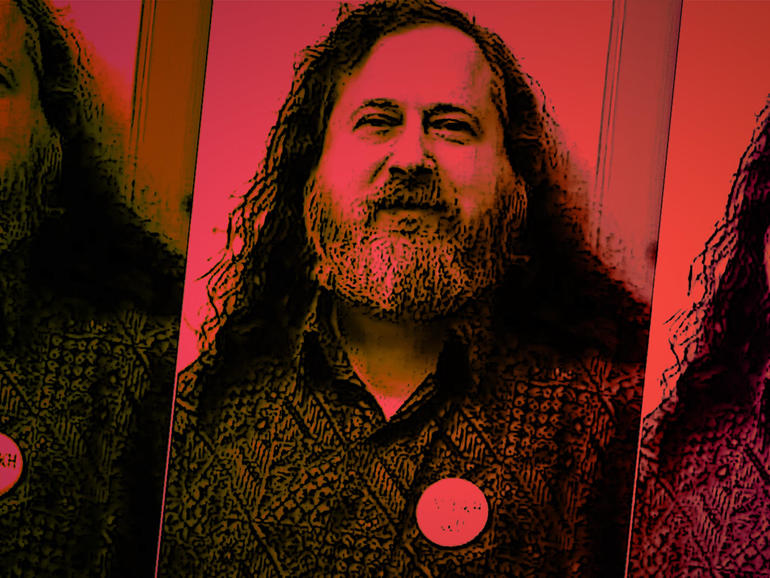In the aftermath of the Me Too movement and his defense of the behavior of the late Marvin Minsky, AI pioneer and associate of notorious billionaire sex offender Jeffrey Epstein, Richard M. Stallman (RMS) resigned as president and board member of the Free Software Foundation (FSF) on 16 September 2019. Now, RMS has announced on video that “I am now on the Free Software Foundation board of directors once again.“
RMS is still well known in free software and open-source circles for his work. He first built his reputation by taking James Gosling’s Emacs text editor and relicensing it under GNU Public License (GPL). The GPL was the first free software license. This led to a term RMS hates: “open-source” licenses and software. He also created the GCC family of compilers. For his work, he has earned accolades such as a MacArthur Genius award.
Recently, he’s become known more as being a crank who insists that Linux should be known as GNU Linux and he has alienated many of his closest supporters over the years.
GPL version 3 (GPLv3), which was released in 2007, was RMS’s last significant work.
Even though RMS officially resigned in some ways, he never actually left the FSF. Stallman has remained in charge of the GNU Project. This organization served as the home for GNU Emacs and other GNU programs. This predated the FSF. Indeed, the FSF was set up to sponsor the GNU Project. The site states that “other people became involved in the GNU project, and we decided that it was time to seek funding once again. So in 1985, we created the Free Software Foundation (FSF), a tax-exempt charity for free software development.”
Since RMS headed both the FSF and the GNU Project, this left confusion in its wake. The FSF acknowledged as much at the time: “The relationship between the FSF and GNU has been fluid … GNU decision-making has largely been in the hands of GNU leadership. Since RMS resigned as president of the FSF, but not as head of GNU (‘Chief GNUisance’), the FSF is now working with GNU leadership on a shared understanding of the relationship for the future.”
The FSF has also not announced that RMS has returned to the board and FSF leadership has not answered questions about RMS’ declaration that he’s returned to the board. It wasn’t mentioned in the daily LibrePlanet 2021, the FSF free software conference news blog. The FSF site, however, does list RMS now as a member of the board of directors.
In his brief statement, RMS also added that the FSF couldn’t create a video announcement of its own so it used the LibrePlanet 2021’s live stream, which nixCraft, an open-source and Linux DevOps and SysAdmin site, tweeted, to make the news public.
RMS continued, “Some of you will be happy about this and some of you will be disappointed. … In any case, that’s how it is and I’m not planning to resign a second time.”
Indeed, some people are happy that RMS is back. But some top movers and shakers of today’s open-source software world are not happy.
Josh Simmons, president of the Open Source Initiative (OSI), which oversees open-source licenses, tweeted “I am shocked and appalled by the news out of LibrePlanet that RMS, a known harasser, is returning to the FSF Board.”
VM (Vicky) Brasseur, an award-winning free/open-source advocate and corporate strategist, said, “A little over a year ago I finally joined @fsf“. They had finally taken action against RMS, a man who has not only been demonstrably toxic himself but is also a role model of toxicity in #FreeSoftware. RMS was holding FSF and Free Software back. Despite that well-known toxicity, FSF announced on Twitter that RMS is returning to its board of directors. Their one step forward in September 2019 converted to two large steps back to the Free Software dark ages.”
Mozilla Senior IP and Product Counsel, Daniel Nazer, observed, “Even leaving aside his creepiness, RMS hasn’t done any effective public advocacy outside his cult-like bubble in decades.”
While RMS’ supporters still cheer him on, there are fewer and fewer of them since he’s continued to alienate many people from the free software world and has done no significant work in well over a decade. The free and open-source community owe RMS a debt of his gratitude for his pioneering licensing and programming work in the 80s. But, in the 2020s, many see him as having outworn his welcome thanks to his misogynistic, self-aggrandizing ways. His return to the limelight is unlikely to help the FSF or free software.



